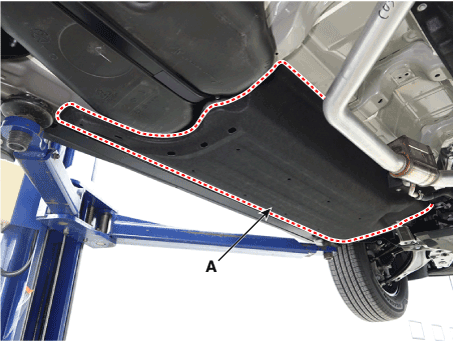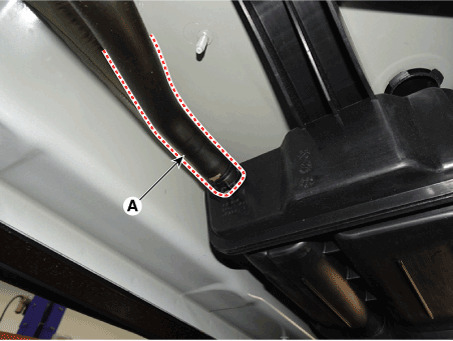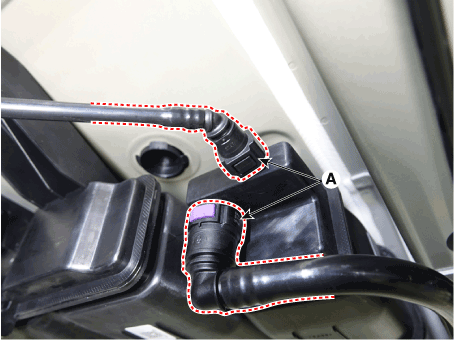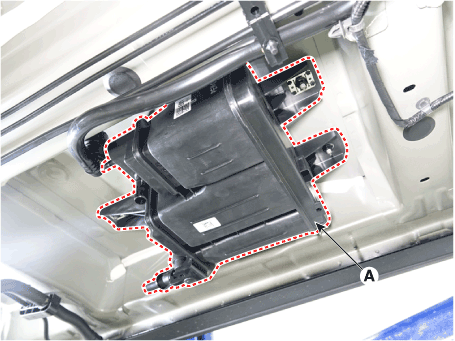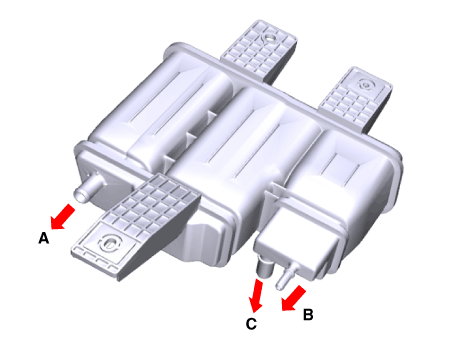Hyundai Santa Fe: Evaporative Emission Control System / Canister. Repair procedures
Hyundai Santa Fe (TM) 2019-2025 Service Manual / Emission Control System / Evaporative Emission Control System / Canister. Repair procedures
| Removal |
|
| 1. |
Turn the ignition switch OFF and disconnect the battery (-) terminal.
|
| 2. |
Remove the floor under cover (A).
|
| 3. |
Disconnect the vent hose (A).
|
| 4. |
Disconnect the vapor hose quick-connector (A).
|
| 5. |
Remove the canister (A) after loosening the mounting nuts.
|
| Installation |
| 1. |
Install in the reverse order of removal.
|
| Inspection |
| 1. |
Check for the following items visually.
A : Canister ↔ Atmosphere
B : Canister ↔ Fuel Tank
C : Canister ↔ Intake Manifold
|
 Schematic diagrams
Schematic diagrams
Schematic Diagram
Canister
Canister is filled with charcoal and absorbs evaporated vapor in fuel tank.
The gathered fuel vapor in canister is drawn into the intake manifold by the
ECM/PCM when appropriate conditions are set...
 Fuel Filler Cap. Description and operation
Fuel Filler Cap. Description and operation
Description
A ratchet tightening device on the threaded fuel filler cap reduces the chances
of incorrect installation, which seals the fuel filler...
Other information:
Hyundai Santa Fe (TM) 2019-2025 Owner's Manual: Tire sidewall labeling
This information identifies and describes the fundamental characteristics of the tire and also provides the tire identification number (TIN) for safety standard certification. The TIN can be used to identify the tire in case of a recall. 1. Manufacturer or brand name Manufacturer or brand name is shown...
Hyundai Santa Fe (TM) 2019-2025 Service Manual: Blower Motor. Repair procedures
Inspection 1. Connect the battery voltage and check the blower motor rotation. 2. If the blower motor does not operate well, substitute with a known-good blower motor and check for proper operation...
Categories
- Manuals Home
- 4th Generation Santa Fe Owners Manual
- 4th Generation Santa Fe Service Manual
- Brake bleeding procedures
- Side air bags
- Warning and indicator lights
- New on site
- Most important about car
Vehicle Identification Number (VIN). Vehicle certification label. Tire specification and pressure label
Vehicle Identification Number (VIN)
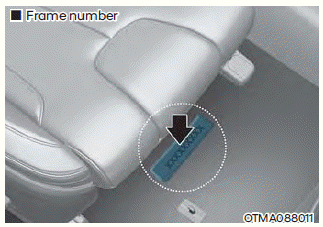
The vehicle identification number (VIN) is the number used in registering your vehicle and in all legal matters pertaining to its ownership, etc.
The number is punched on the floor under the passenger seat. To check the number, open the cover.
Copyright © 2025 www.hsafe4.com


